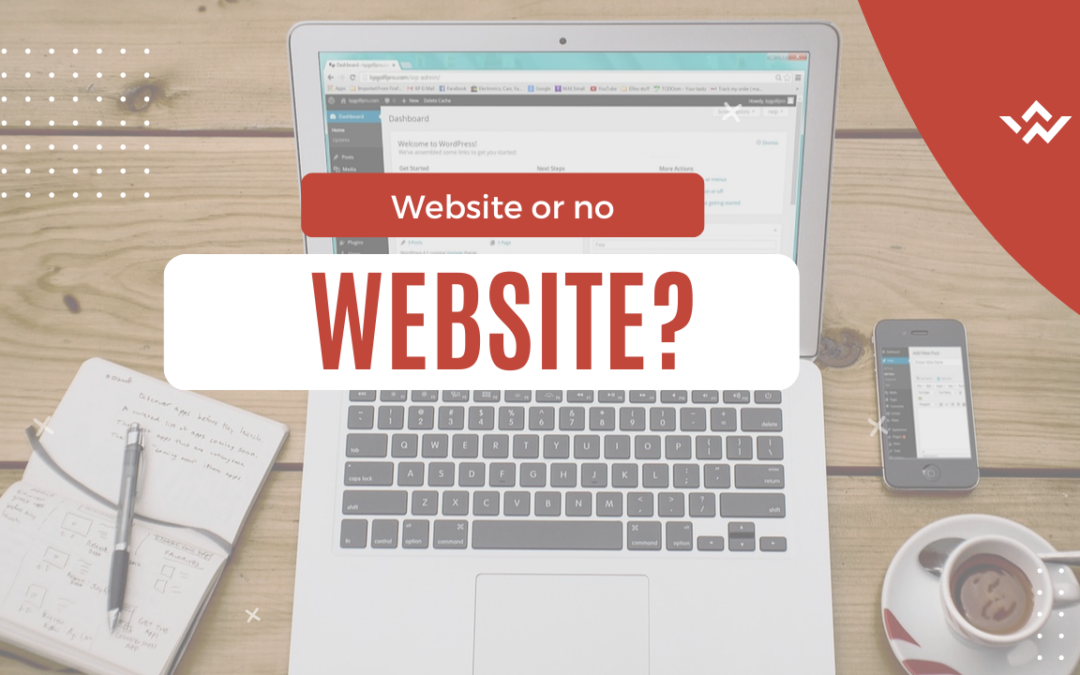Why Websites Are Important For Small Businesses
Should you focus on creating a website for your small business?
Whenever I mention that I specialise in marketing, the first question I’m often asked is, “Do you build websites?” There’s a common belief that marketing and websites are inseparable for small business owners. However, I must debunk this myth: while a website holds significance, it’s not the sole determining factor in your marketing efforts. There are other crucial considerations, such as driving traffic to your site and converting visitors into customers.
Nevertheless, integrating a website into your marketing strategy can be immensely beneficial for small businesses. Here’s why:
Branding amplification for your small business
Your website serves as an extension of your brand identity. By adhering to your brand guidelines and maintaining consistency across various platforms, you can strengthen brand recognition and foster a deeper connection with your audience. Take cues from global brands like Nike and Apple, whose websites reflect their distinct branding elements, thereby creating a cohesive brand experience for visitors.
If you do not have a website and one of your potential customers performs a search for your company online, what will show up? Having a website is one of the best ways to get found in the major search engines such as Google, Yahoo, and Bing for your branded terms, and this can do wonders for your brand image online. If nothing else, it allows you to control the narrative of what is being said about your brand online. A company’s website is usually the first thing that comes up when you search for a small business using Google. Some people may have written stories about your brand or mentioned your brand online. Some of these stories might be good, and others might be negative, but at least with your website there, you have the chance to tell your own story rather than being at the mercy of what the internet might say.
Enhanced Customer Engagement
Your website acts as a virtual storefront where customers can explore your offerings and learn more about your business. Features like the About page provide valuable insights into your brand story and values, helping potential customers build trust and confidence in your business. A professionally designed website can significantly influence purchasing decisions by instilling trust and credibility.
Sometimes your customer might be on the verge of making a buying decision with you, but first, they want to do a little bit of background research. The first thing they are likely to do is check out your website to see what you are about. If you don’t have one, but one of your competitors does and they outline all of the benefits of working with them, guess what, you may have just lost yourself a customer.
Ownership of Customer Base
Unlike marketing solely on third-party platforms, owning a website gives you complete control over your customer base. You’re not bound by platform restrictions or subjected to profit-sharing arrangements. With your website, you dictate the rules and have the autonomy to tailor the user experience according to your business goals.
This is one of the reasons why I do not recommend solely relying on social media platforms to run your business. These platforms can decide that you have broken their terms at any moment, and all of the followers you build can be gone overnight if they decide to suspend your account. This is not to say you should live in fear and not do social media marketing for your small business; however, building your website too means you always have a place to call home and a place where your customer can find you that you control.
Search Engine Visibility for your small business
A website opens doors to increased visibility on search engines like Google. Through search engine optimisation (SEO) techniques, you can optimise your website pages, products, and posts to rank higher for relevant keywords, driving organic traffic and attracting potential customers. Additionally, leveraging online paid ads directed to your website can yield better returns, as your site is optimized to convert visitors into customers.
Remember, it’s not just about building a website; it’s about driving new customers to your website on a consistent basis, and SEO gives you the ability to show up when your potential customers are searching the internet. You can create unlimited pages on your website that answer the questions your target audience may have and provide products and services that they are searching for. Your website will become one of the best ways to be found online to capitalise on these marketing opportunities.
Tips for Building a Stellar Website for your small business
When it comes to creating a website, you want to ensure that it not only looks the part but also converts your website visitors into customers for your business. You want to ensure that you:
– Prioritize user experience by ensuring easy navigation and fast loading times.
– Create compelling and informative content that resonates with your target audience.
– Incorporate multimedia elements like videos to showcase your brand personality and expertise.
– Regularly update your website with fresh content to keep visitors engaged and informed.
A website serves as a cornerstone of your digital presence, offering a great deal of benefits for small businesses. By investing in a well-designed website and implementing effective marketing strategies, you can elevate your brand visibility, engage customers, and drive business growth.
To prioritise user experience, focus on creating a website that is intuitive and effortless to navigate. Start by organizing your content logically, with clear navigation menus and easily identifiable links. Implementing a user-friendly interface will help visitors find the information they need quickly and efficiently.
In addition, optimise your website for fast loading times to prevent user frustration and encourage engagement. Compress images, minify CSS and JavaScript files, and leverage browser caching to reduce loading times. Consider utilizing a content delivery network (CDN) to deliver content faster to users across different geographic locations.
Regularly test your website’s performance using tools like Google PageSpeed Insights or GTmetrix to identify areas for improvement. By prioritizing user experience through easy navigation and fast loading times, you can enhance visitor satisfaction and encourage repeat visits.
Creating compelling and informative content is essential for engaging your target audience and establishing your brand as an authority in your industry. Start by conducting research to understand your audience’s needs, interests, and pain points. Use this insight to develop content that addresses their specific challenges and provides valuable solutions.
Focus on crafting high-quality content that is both informative and engaging. Use a mix of formats, such as blog posts, articles, infographics, and case studies, to cater to different learning styles and preferences. Incorporate storytelling techniques to captivate your audience and make your content more relatable and memorable.
When creating content, ensure that it is well-researched, accurate, and up-to-date. Use data, statistics, and expert opinions to support your claims and provide credibility to your content. Don’t forget to optimise your content for search engines by incorporating relevant keywords and meta tags to improve visibility and attract organic traffic.
By creating compelling and informative content that resonates with your target audience, you can build trust, establish credibility, and position your brand as a trusted resource in your industry.
Incorporating multimedia elements like videos can add depth and personality to your website, making it more engaging and memorable for visitors. Videos allow you to showcase your brand personality, demonstrate your products or services, and share valuable insights with your audience.
Start by identifying the types of videos that will resonate with your target audience. Consider creating product demonstration videos, customer testimonials, behind-the-scenes footage, or educational tutorials. Use storytelling techniques to create compelling narratives that capture your audience’s attention and keep them engaged.
When producing videos, focus on quality and professionalism. Invest in high-quality equipment, lighting, and sound to ensure that your videos look and sound professional. Pay attention to editing and post-production to enhance the overall visual appeal of your videos.
Once you’ve created your videos, make sure to optimise them for search engines by including relevant keywords in the titles, descriptions, and tags. Share your videos across your website, social media channels, and email newsletters to maximise their reach and engagement.
By incorporating multimedia elements like videos into your website, you can showcase your brand personality, demonstrate your expertise, and create memorable experiences for your audience.
Regularly updating your website with fresh content is essential for keeping visitors engaged and informed. It demonstrates that your brand is active, relevant, and committed to providing value to your audience. Additionally, fresh content can improve your website’s search engine rankings and attract more organic traffic.
Develop a content strategy that outlines the types of content you’ll create, how often you’ll publish new content, and the topics you’ll cover. Consider creating a content calendar to schedule and organize your content creation efforts, ensuring consistency and alignment with your overall marketing objectives.
When creating new content, focus on providing value to your audience by addressing their needs, interests, and pain points. Conduct keyword research to identify relevant topics and optimize your content for search engines. Use a mix of formats, such as blog posts, articles, videos, infographics, and podcasts, to cater to different preferences and learning styles.
Encourage user engagement by inviting comments, questions, and feedback on your content. Respond promptly to comments and engage with your audience to foster a sense of community and connection.
By regularly updating your website with fresh, relevant content, you can keep visitors engaged, attract new audiences, and position your brand as a trusted source of information and expertise.
To learn more about how to market your small businesses website online, make sure you download ‘The Formula’ for free.

The Free Guide To Generating Leads & Sales Online
In The Formula, I break down how you can drive quality visitors to your website & convert those visitors into leads and sales for your business




